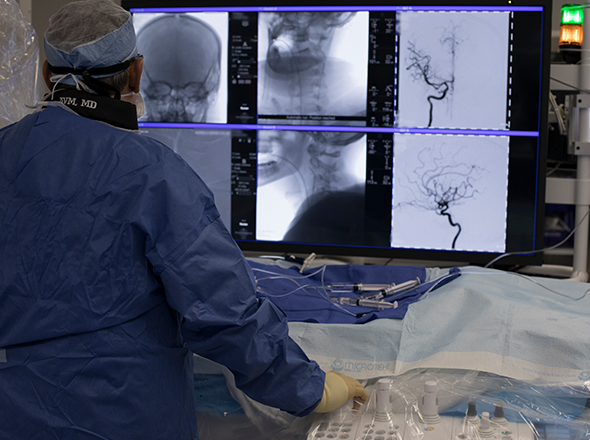UT Southwestern Medical Center is expanding its neurosurgery program to Texas Health Presbyterian Hospital Dallas as part of the two organizations’ commitment to offering convenient access to advanced care and the latest scientific applications for the treatment of complex brain and spinal cord conditions.
The practice, called the UT Southwestern Neurosurgery at Texas Health Dallas, adds four neurosurgeons from UT Southwestern’s Peter O’Donnell Jr. Brain Institute to the medical staff at Texas Health Dallas.
“This further advances the renowned specialty care that our hospital has always been known for,” said Jim Parobek, interim president of Texas Health Dallas. “This builds on that legacy by bringing UT Southwestern’s world-class neurosurgery program to our campus, right down the street from where North Dallas residents live.”

Joining forces, combining resources
UT Southwestern’s neurosurgery program — ranked as one of the best in the nation by U.S. News & World Report — will still offer its same array of services on its main campus while expanding to Texas Health Dallas. Physicians at the new practice will treat various neurosurgical conditions, from aneurysms and stroke to brain cancers and traumatic head injuries, as well as spinal deformities, scoliosis and other spine conditions, along with peripheral neuropathy, which affects nerves outside the brain and spinal cord.
“We’re blending the strengths of one of the nation’s top neurosurgical programs with one of the region’s most respected hospitals,” said John Warner, M.D., executive vice president for health system affairs for UT Southwestern. “It’s a powerful combination that will increase access in this community to the best in modern medicine.”
The UT Southwestern neurosurgeons and their team will also conduct research along with their clinical work.
“That will further infuse the Texas Health Dallas campus with the academic environment of UT Southwestern,” Jim said. “I think that advances the care of all our patients.”
Using innovation to enhance patient care
The new neurosurgical practice also includes the creation of a neurological intensive care unit at Texas Health Dallas with UT Southwestern neuro-intensivists staffing the ICU to treat the complex needs of neurological patients. The neuro ICU is fully equipped with neuroimaging and monitoring capabilities, including cerebrovascular ultrasound and advanced brain and spine monitoring capabilities.
“We want this to be a comprehensive program with advanced capabilities that is known just as much for the compassionate, holistic way it treats patients,” said Chris Taylor, M.D., who leads the new practice and is professor of neurosurgery at UT Southwestern. “To achieve this, the program will use a multi-disciplinary approach, with input from various caregivers, with the needs of patients and their families as our driving mission.”
Taylor becomes the medical director of neurosurgery at Texas Health Dallas while still serving as vice chair of neurosurgery at UT Southwestern. He also remains a professor of neurosurgery at UT Southwestern.
The three other neurosurgeons joining Taylor in the program are Kathryn Hoes, M.D., assistant professor of neurosurgery at UT Southwestern; Anthony Maioriello, M.D., assistant professor of neurosurgery at UT Southwestern; and Russell Payne, M.D., assistant professor of neurosurgery at UT Southwestern.
New clinic exemplifies Southwestern Health Resources’ importance
The creation of a neurosurgical practice at Texas Health Dallas with UT Southwestern physicians is an example of the power of Southwestern Health Resources, the clinically integrated network created by Texas Health Resources and UT Southwestern, Jim said.
“The goal of Southwestern Health Resources has always been to provide access to a comprehensive range of services and quality care,” he said. “We like to say that it’s simply about making health care better. That means focusing on the full range of services, from primary care to treating complex diseases, which this new neurosurgical program will do.”
In addition to complex brain and spine surgeries, physicians with the program will perform outpatient procedures and see patients at their permanent offices on the Texas Health Dallas campus.
“This program is an example of Texas Health and UT Southwestern changing the way we deliver care in North Texas to becoming more consumer centric,” John said. “We’re creating a comprehensive neurosurgical program that didn’t exist in the North Dallas area.”
The addition of UT Southwestern Neurosurgery at Texas Health Dallas is part of the hospital’s overall expansion of its neurosciences program, which includes neurologists and other independent physicians on the hospital’s medical staff.
The robust program will provide patients with what’s called quaternary care, meaning the service is specialized for complex cases, often with clinical trials and scientific research to advance patient care. Programs like this feature various medical specialties that deliver care not every hospital or medical center can offer at that same level of expertise.
“The patient journey doesn’t end after surgery or discharge from ICU,” Jim said. “That’s why Texas Health Dallas already has a well-established comprehensive stroke center, a dedicated inpatient rehabilitation unit, a comprehensive outpatient rehab unit, along with wellness programs for individuals recovering from neurological disease and neuro trauma. We’re making this impressive program even better.”
The clinic is located in Texas Health Dallas’ Professional Building 3, Suite 514, at 8230 Walnut Hill Lane.
(Pictured: Dr. Anthony Maioriello performs a cerebral angiography procedure at Texas Health Presbyterian Hospital Dallas.)
By Chandra Caradine • Posted January 7, 2020

